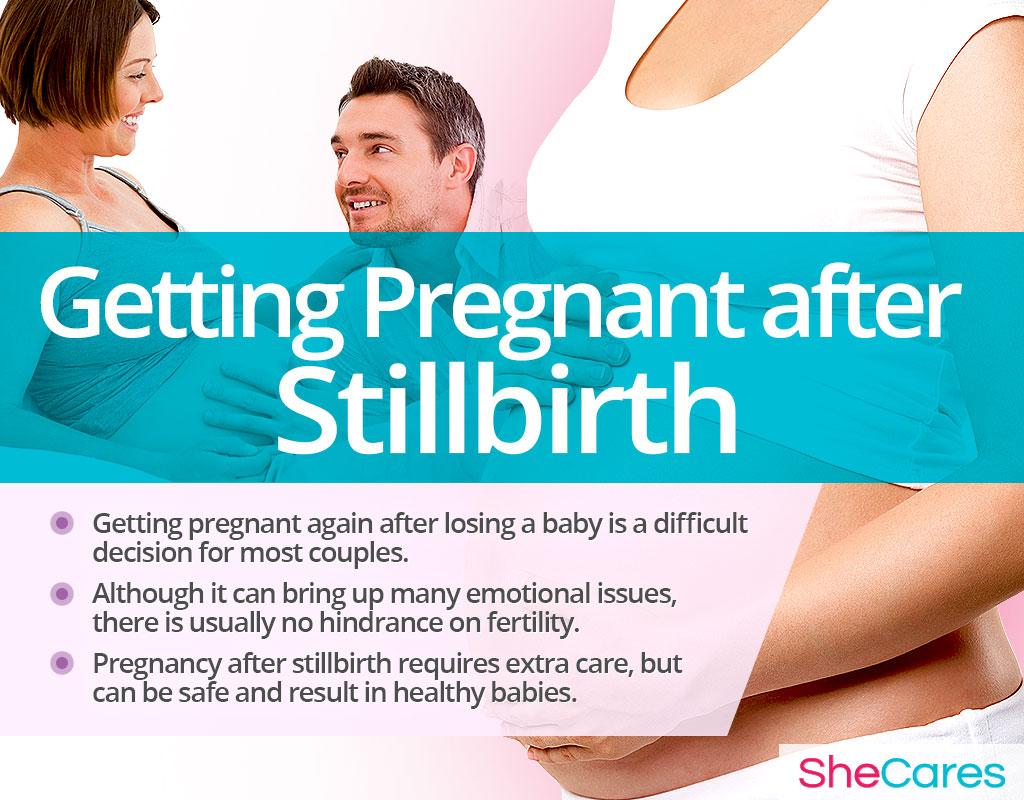Brief Overview of Stillbirth
Stillbirth is a pregnancy loss that occurs after the 20th week of pregnancy, either in utero or during delivery.
In up to 50% of pregnancy losses, the underlying cause remains unknown. The majority of them are caused by congenital abnormalities, placental problems, and other complications during pregnancy.
Effects of Stillbirth on Getting Pregnant
Effects on Fertility
Generally, a stillbirth does not negatively affect women's fertility. Depending on the week of gestation during which pregnancy loss has occurred, menstruation usually returns within six weeks and so does a woman's fertility.
Effects on Women's Health
In most cases, a stillbirth is similar in its effects to a full-term pregnancy. Unless there were additional complications, a woman's health is greatly unaffected. Postpartum care is designed to prevent infections and hemorrhages as well as to give the reproductive organs time to heal.
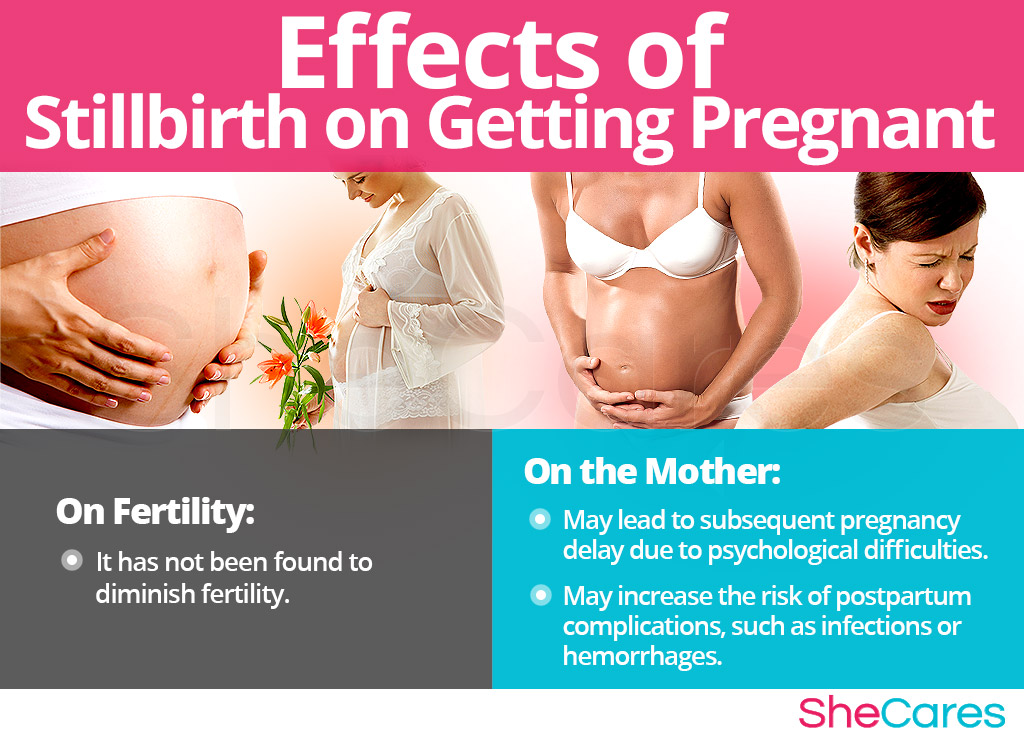
Action Plan
From the medical standpoint, women are advised against getting pregnant too soon after going through a stillbirth. However, the length of time a woman should wait depends on her individual health status and whether or not there were additional complications. It might range from three months to up to a year, with many doctors leaning towards six months.
A woman's emotional readiness to get pregnant again, on the other hand, is highly individual and has to be decided with partner.
Months Prior to Conceiving after Stillbirth
Your goal before conception is to allow your body to heal and get stronger with proper diet, natural supplements, and other healthy lifestyle habits. You might find the following recommendations useful as you prepare for becoming pregnant.
Healthy Diet
There might be certain deficiencies in a woman's diet that can increase the risk of pregnancy complications. To provide your body with the best nutrition and increase your fertility, compose your meal plan of foods from all groups, such as:
Phytoestrogenic foods: barley, spinach, and berries
Lean protein: eggs, fish, and turkey
Whole grains: quinoa, buckwheat, and brown rice
Full-fat dairy: yogurt, whole milk, and cheese
Probiotic foods: fermented cabbage, kefir, and kombucha
Fruits and vegetables: at least half of them raw
Exercise
Since stillbirths occurs after the 20th week of pregnancy, many women will already have had gained some weight as a natural part of childbearing. Excess weight, however, can inhibit fertility and put women at risk for complications. So, it is recommended to reach a healthy weight prior to conceiving.
Opt for cardio workouts and other medium-intensity exercises, such as swimming, brisk walking, or dancing.
Try to get half an hour of physical activity daily, 5 days a week, which adds up to 150 minutes per week.
Avoid strenuous exercises as it can deregulate your menstrual cycle and inhibit your fertility.
Supplements
To make sure you don't have any nutritional deficiencies, replenish vitamins and minerals that you might have lost during pregnancy, and prevent birth defects, your doctor might recommend the following supplements:
Prenatal vitamins, including folic acid, should ideally be taken three to six months before conceiving to boost fertility and prevent complications.
Hormone-regulating supplements, like Macafem, have been shown to promote hormonal balance and regulate menstruation, thus increasing your chances of getting pregnant.
Contraception
Until your body and mind recover from a stillbirth, it is recommended to prevent getting pregnant as it might lead to further complications. Your OBGYN will give your recommendations as far as the best method of contraception for you at the moment.
Testing
Following a stillbirth, both you and your baby will have to undergo various tests in attempt to reveal the cause of complications.
Your doctor will run some tests to rule out any undiagnosed chronic conditions, ongoing infections, or genetic abnormalities.
The body of your baby and the placenta will be thoroughly examined to check for any defects.
Psychotherapy
Most women's bodies recover much quicker than their psyche. If you are struggling with emotional issues, there are a number of ways in which you can get the support you need. They include:
Psychotherapy with a licensed mental care professional, who can prescribe antidepressants, if necessary
Local stillbirth support groups gathering women who have had similar experiences
Free help lines offering professional help 24 hours a day, 7 days a week
It is also very important to surround yourself with people you can lean on in the times of need.
Good Habits
Maternal addictions are one of the most frequent causes of stillbirth. So, in those months of preparation for getting pregnant, do your best to quit smoking, drinking excess alcohol, and taking drugs.
Track your menstrual cycle to be able to estimate your ovulation date and fertility window.
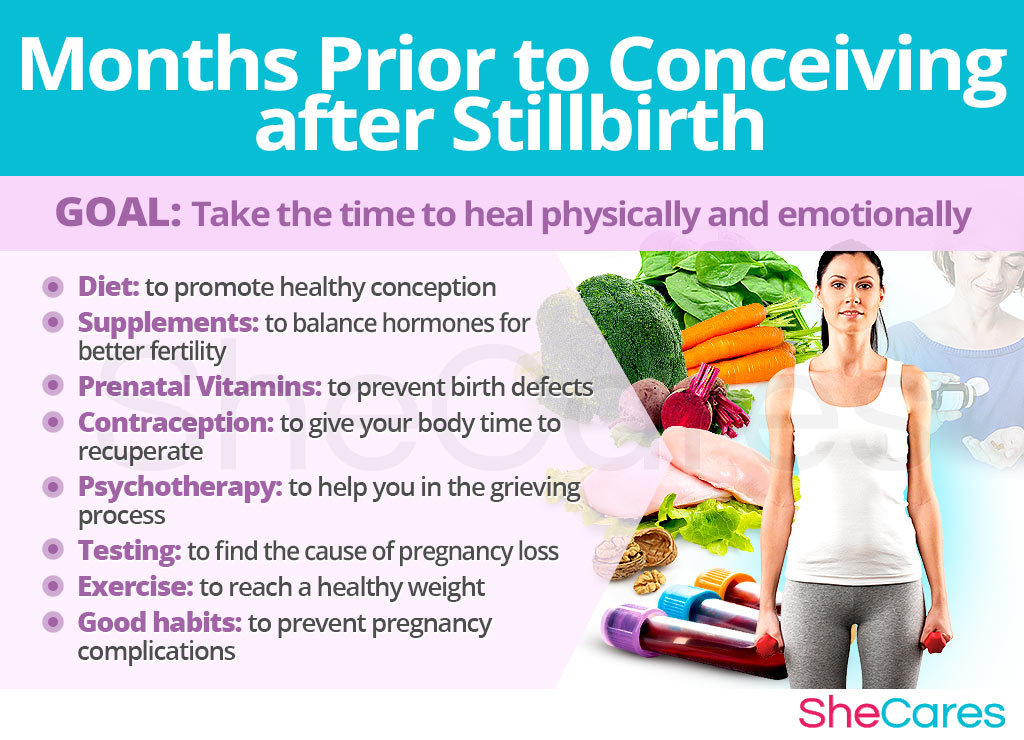
Tips for Conceiving after Stillbirth
When the time is right, your doctor will let you know that it is okay to get pregnant again. Although it is very unlikely that the previous stillbirth has had any negative effects on your fertility, it might take you and your partner several ovulation cycles to conceive. To increase your chance of succeeding, consider the following:
Add more plant-based protein sources, such as beans, nuts, and whole grains. Also, eat more eggs and full-fat dairy, like natural yogurt or cheeses.
Drink plenty of water to make your cervical fluid more sperm-friendly and encourage conception.
Have frequent sex, especially five days before and on the day of your ovulation, to optimize your chances of conceiving.
Practice light sports and stress-reduction strategies, like breathing exercises, as prolonged stress and anxiety can inhibit your fertility.
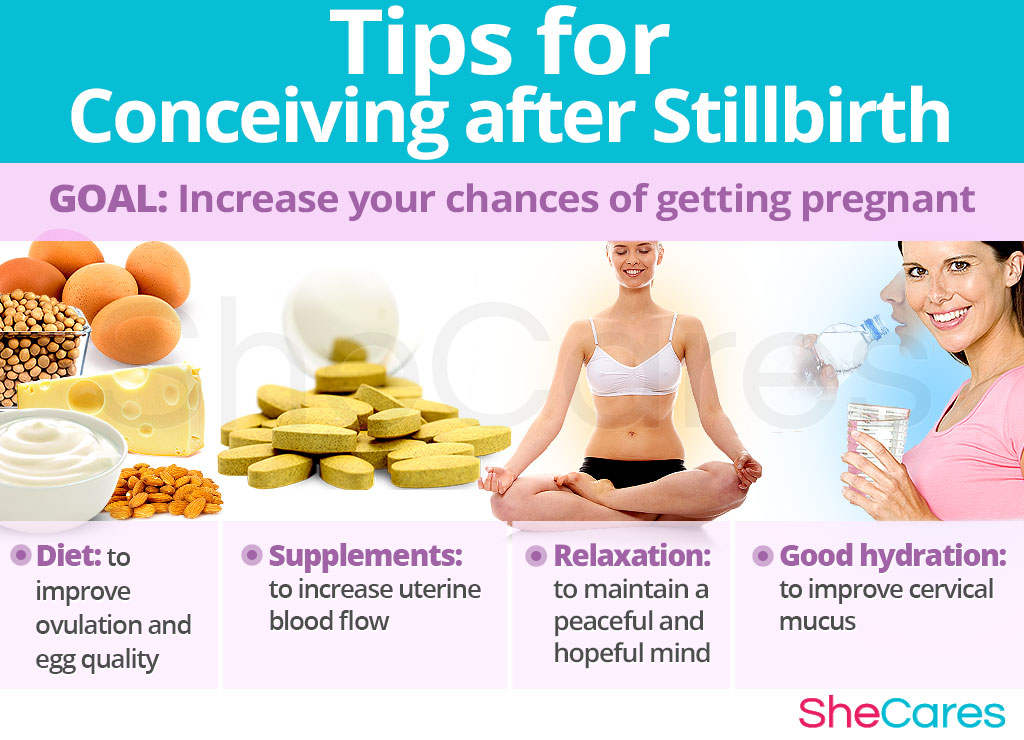
Pregnancy after Stillbirth
You might find it difficult to stop your mind from over-analyzing every single symptom you might have, worrying that it might signal another stillbirth. Try to find comfort in regularly reassuring yourself that you did everything that was in your power to prepare for this pregnancy and give your baby a healthy start in life.
Maintain frequent check-ups to remain sure that your pregnancy is progressing as it should.
Focus on your favorite practices that bring you calmness and peace, such as long walks, reading, listening to music, or meditation. A new hobby is another way to keep your mind distracted from getting anxious.
Make sure you have your family and friends nearby for extra emotional support.
Reinforce healthy habits, including diet, lots of rest, and gentle exercise, to stay in optimal health throughout pregnancy.
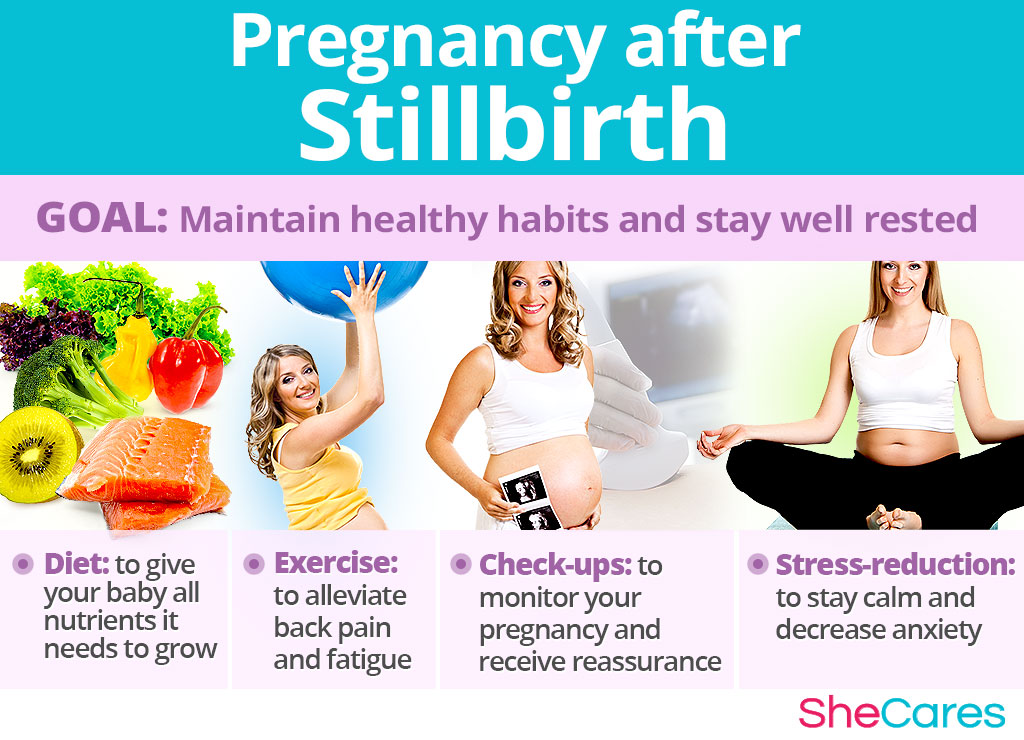
Kew Takeaways
Understandably, going through a subsequent pregnancy after a stillbirth can be truly nerve-wrecking. Many women report that being proactive in their approach to getting pregnant again has helped them feel more reassured and less anxious throughout those nine months and beyond. When you feel the time has come to conceive again, use the aforementioned recommendations, including a well-balanced diet, regular exercise, and natural supplements, such as Macafem, as your guide to a healthy pregnancy and happy motherhood.
Sources
- American Pregnancy Association. (2015). Stillbirth: Surviving Emotionally. Retrieved March 4, 2018 from http://americanpregnancy.org/pregnancy-loss/stillborn-surviving-emotionally/
- Current Psychiatry Reports. (2016). Infertility and Perinatal Loss: When the Bough Breaks. Retrieved March 4, 2018 from https://www.ncbi.nlm.nih.gov/pmc/articles/PMC4896304/
- Facchinetti, F. et al. (2010). Stillbirth: Understanding and Management. Retrieved March 4, 2018 from https://books.google.com.pe/books?id=OqDSBQAAQBAJ&printsec=frontcover#v=onepage&q&f=false
- March of Dimes. (2017). Stillbirth. Retrieved March 4, 2018 from https://www.marchofdimes.org/complications/stillbirth.aspx
- Spong, C. Y. (2011). Stillbirth: Prediction, Prevention, and Management. Retrieved March 4, 2018 from https://books.google.com.pe/books?id=ObE3S8444CMC&pg=PA65&lpg=PA65&dq=site:+.edu+stillbirth&source=bl&ots=06kqXGQCb2&sig=jLjk9tauQ96J_Hn9Cc7jgvfS2Po&hl=es-419&sa=X&ved=0ahUKEwjw4tatlv7YAhWGu1MKHaK4B5wQ6AEIXzAG#v=onepage&q=site%3A%20.edu%20stillbirth&f=false
- Stanford Children's Hospital. (n.d.). Stillbirth. Retrieved March 4, 2018 from http://www.stanfordchildrens.org/en/topic/default?id=stillbirth-90-P02501
- WHO. (2018). Stillbirths. Retrieved March 4, 2018 from http://www.who.int/maternal_child_adolescent/epidemiology/stillbirth/en/
- Women's Health. (2017). Pregnancy loss. Retrieved March 4, 2018 from https://www.womenshealth.gov/pregnancy/youre-pregnant-now-what/pregnancy-loss
